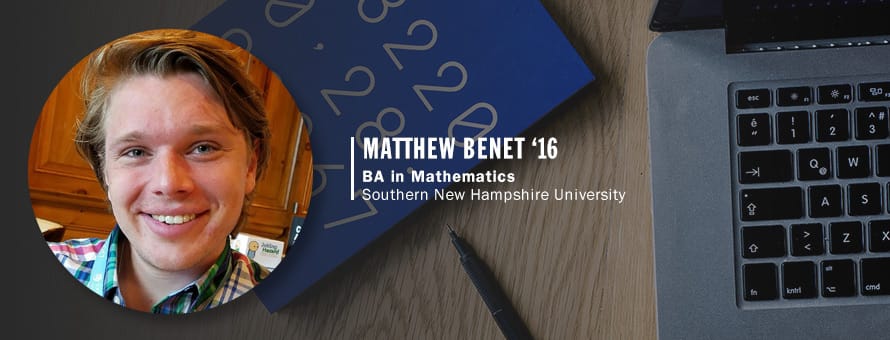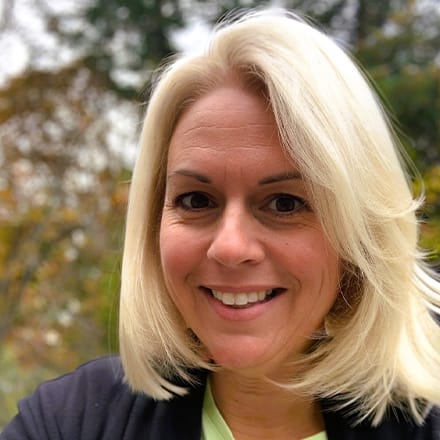Alumni Scores Perfect Math GRE and Accepts Position with Johns Hopkins

Matthew Benet '16 believes that most processes in the world could be made more efficient by utilizing math concepts. So many students are turned off by math due to one bad class or teacher and believe that they are bad at math, he said, when really, it's likely because it wasn't explained to them in a way that clicked.
Now a math teaching assistant working at Johns Hopkins University's Center for Talented Youth summer program, that's just what Benet is trying to do; make math click for exceptional junior high and high school students. Rather than work as a data analyst on Wall Street, Benet is using his love and aptitude for math to help inspire young minds and decide if he'd like to focus on teaching math at the college level.
"Throughout high school I made it a point to help my fellow classmates understand what was frustrating them in math and would always strive for the moment when they got a big smile on their faces and started enjoying themselves," Benet said.
Although Benet scored a perfect score of 170 on his math GRE and has always found math to be his strong subject, he admits his road to college success was far from linear. He first attended community college because he couldn't afford to attend a four-year university. Benet enrolled in SNHU's online program so that he would work full-time at a bank and as a math tutor. Benet's work hours crept up to more than 65 hours a week, making his work-life balance challenging at times. Yet, he persisted.
Benet minored in computer information technology and completed academic projects related to wealth inequality, business growth and opportunity analysis, but chose to major in math. The Mensa International member, who also scored in the top 2% on the math SAT, said although he could have chosen a career in computer science or engineering, he finds the field of math to be his true calling.
"There is nothing more pure than math; it's the core basic universal truth. Science is a theory that somewhere down the line might be disproven by some improbable possibility. I love science, but no matter what, math ties into everything," he said.
Given the right data, math can be used to solve major political, economic, and healthcare problems, according to Benet. One of his favorite SNHU course projects involved researching the correlation between raising the minimum wage and its effect on wealth inequality in America. A highly political topic, Benet said that math behind the problem changed his viewpoint. Benet looked at 17 variables and found a direct correlation between minimum wage increasing and income inequality decreasing using data back to the 1950s.
"I went into it blind, not knowing what I would find, but knowing it was very important," Benet said. "I ended up finding that there is a strong correlation between a low minimum wage and high income inequality.
Benet's career advisor, Caitlin Glennen, said you can tell Benet is extraordinary not only because of his intellect and gift for math, but also because of his sociable and interactive style. Excited by the prospect of learning and networking, Glennen describes him as incredibly kind, putting his mind to solving problems and puzzles that benefit others.
"Matt knew he wanted to work with numbers, but he also really has this part of him that likes to help others. Luckily for him, being great at math allows you to help companies, internal decision makers or even students, like he is doing in his Johns Hopkins role," she said. "Matt is not the type of student that would thrive in a role where he kept his head down and crunched numbers all days without that added component of being able to communicate the insights he discovered once he did crunch those numbers."
Benet is excited for what awaits him in the future and hopes to attend graduate school. He aspires to become a college professor and continue to inspire students to embrace math.
"I want to do my part to be as productive and helpful as possible to help the human race as a whole succeed."
Krysten Godfrey Maddocks '11 is a writer and marketing/communication professional. Connect with her on LinkedIn.
Explore more content like this article

Academic Spotlight: Tyra Davey, Associate Dean of STEM Programs

What Does an Environmental Scientist Do?

How to Get Into AI: What AI at Work Looks Like for Beginners
About Southern New Hampshire University

SNHU is a nonprofit, accredited university with a mission to make high-quality education more accessible and affordable for everyone.
Founded in 1932, and online since 1995, we’ve helped countless students reach their goals with flexible, career-focused programs. Our 300-acre campus in Manchester, NH is home to over 3,000 students, and we serve over 135,000 students online. Visit our about SNHU page to learn more about our mission, accreditations, leadership team, national recognitions and awards.


